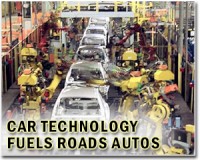 |
Manila (AFP) April 15, 2011 The Philippines wants to replace millions of petrol-powered tricycles with electric ones as part of efforts to clean up the nation's polluting mass transport system, President Benigno Aquino said Friday. The government will initially replace 20,000 tricycles that ply minor streets across the capital Manila and eventually expand the project throughout the country, Aquino said in a speech to government employees. It is hoped the scheme will save the impoverished country tens of millions of dollars annually. "The (project) is an ambitious multi-year plan to wean public utility vehicles from the use of gasoline and diesel and to encourage them to shift to alternatives like natural gas, electricity and hybrid engines," he said. "I would like to see the day when nearly all public utility vehicles... run on alternative fuel, freeing the public transport sector and commuters from the threat of unreasonably high oil prices and unhealthy levels of air pollution." Aquino did not give a definite timetable of the programme, which was launched this week when 20 so-called "e-tricycles" hit the streets of a Manila suburb. Manila-based Asian Development Bank, which is funding the initial stage of the project, said transport sector emissions accounted for 30 percent of all pollution in the Philippines. In Manila, vehicle emissions account for 80 percent of all pollution, it said. "A sizeable proportion of vehicle emissions are attributable to inefficient public transport, particularly from tricycles, jeepneys and buses," it added. Jeepneys are colourful small buses that make up the backbone of the country's chaotic mass transport system, locally assembled using second-hand truck engines and transmission systems imported from Japan. Sohail Hasnie, an energy specialist at Manila-based ADB, said more than 3.5 million tricycles operated in the Philippines. These emitted more than 10 million tonnes of carbon dioxide and burned nearly five billion dollars of fuel yearly. "Every 20,000 e-trikes that are introduced to Manila's streets will save the Philippines 100,000 litres of foreign fuel imports each day, saving the country about 35 million dollars annually," Hasnie said. Though the electronic tricycles, which use rechargeable lithium ion batteries, are costlier, older petrol tricycles are more than twice as expensive to operate in the long run, Hasnie added. The carbon footprints of the e-trikes, which are locally produced, would be less than a quarter of conventional tricycles, the ADB said. ADB officials said the Manila-based lender was now in talks with the Philippine government on supporting the expansion of the project.
Share This Article With Planet Earth
Related Links Car Technology at SpaceMart.com
 Aftershocks to Japan automakers 'to last months'
Aftershocks to Japan automakers 'to last months'Tokyo (AFP) April 15, 2011 A component supply crisis that has strangled auto production in Japan and enforced a slowdown overseas in the wake of the March 11 disasters will last several months, analysts say. Japan's biggest ever quake and the tsunami it unleashed shattered supply chains and crippled electricity-generating facilities, including a nuclear power plant at the centre of an ongoing atomic emergency. Po ... read more |
|
| The content herein, unless otherwise known to be public domain, are Copyright 1995-2010 - SpaceDaily. AFP and UPI Wire Stories are copyright Agence France-Presse and United Press International. ESA Portal Reports are copyright European Space Agency. All NASA sourced material is public domain. Additional copyrights may apply in whole or part to other bona fide parties. Advertising does not imply endorsement,agreement or approval of any opinions, statements or information provided by SpaceDaily on any Web page published or hosted by SpaceDaily. Privacy Statement |